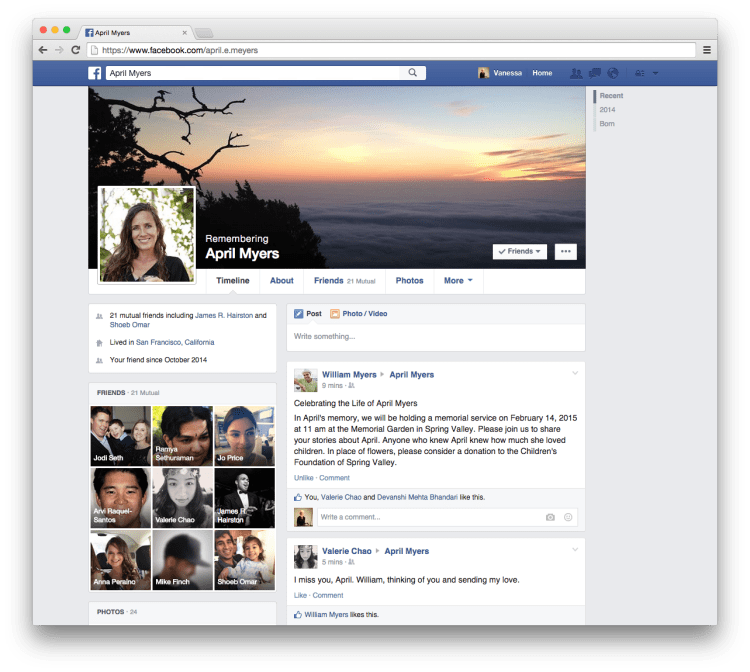What happens to a person’s Facebook profile when they die has been an ongoing and sometimes controversial issue.
Until now, when family or friends notified Facebook that a loved one had died, Facebook verified their death and “memorialized” the account, meaning the account could be viewed but not be managed or edited. The issue has been gaining traction as of late. Last month, a Zogby poll of more than a thousand adults found that 71 percent want their online communications to remain private unless they give prior consent. At the same time, 43 percent want their private accounts on online services deleted unless they have given prior consent for someone else to access them.
Facebook has also received “hundreds of thousands” of requests for access to these memorialized accounts, according to spokesperson Jodi Seth.
Today, Facebook seems to have put the issue to rest. This morning, it announced that it will allow its members to designate a “legacy contact.” This person will have the right, and the access, to manage a person’s profile after they die.
“One of the most important things we can do when it comes to memorializing someone is to tell stories about who they were, what they meant to you, and therefore what you have lost,” says Jed Brubaker, an “academic collaborator” on Facebook’s legacy contacts project, which is directly related to his doctoral research on digital afterlives at UC Irvine.
The legacy contact won’t be able to edit what the deceased already posted, what friends continue to post on the page, or remove tagged images. Nor will they be able to delete the account. What they will be able to do is write a post that’s displayed at the top of the profile, change profile images on the page, and even respond to new friend requests on behalf of the deceased. Prior permission will also allow them to download an archive of posts and photos (but not private messages).
There’s more fine print that you need to know: You will only be able to choose one person, and no backup. If you don’t choose a legacy contact on Facebook, but someone is named as a digital heir in your will, Facebook will designate that person after that information is confirmed. Members also have the option to have their social media profile deleted entirely upon their passing.
There are still going to be those who will want more access than this, and allowing for additional legacy contacts or more access is something that Facebook is continuing to think about. “We gave this a lot of thought,” Seth said, “and ultimately decided against it for this first version.”
While it might seem like social media is going too far if you have to designate what to do with your profile after death, I for one see this new feature as a way to give people more choices when it comes to their online data.
Here’s how you can designate your Legacy Contact: On the right side of your Facebook page, click on the downward-facing arrow to bring up the drop-down menu. Click on “Settings.” Then choose “Security,” then “Legacy Contact” at the bottom of the page. Next, choose your Legacy Contact from your friends list. Choose the options you want your Legacy Contact to have. Finally, the system will offer an option to send a message to that person, letting them know about their important new duties.



